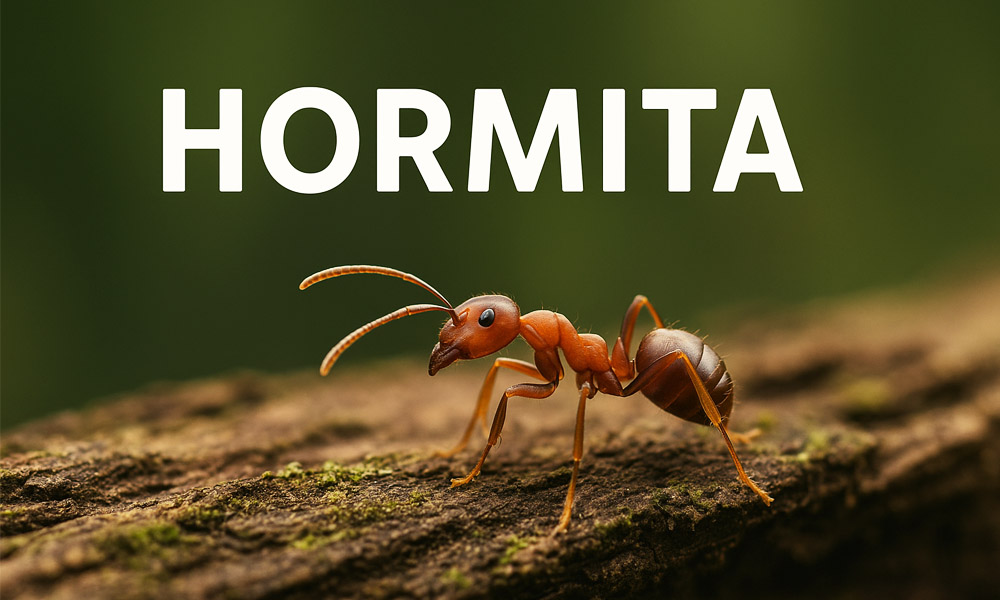Guide
Hormita: What This Little Ant Can Teach Us About Life
Published
6 months agoon
By
George
Have you ever heard the word hormita and wondered what it means? It might sound tiny, but it carries a warm and powerful feeling. Even though it’s not found in big dictionaries, many people use it in real life, especially in Spanish-speaking countries. It shows up in stories, songs, conversations, and even nicknames. That’s what makes it so special.
In this article, we’ll explore everything about hormita. You’ll learn where it comes from, what it means, and why this little word is loved by so many people. The word may be small, but the story behind it is big and full of heart.
What Does Hormita Really Mean?
The word hormita comes from the Spanish word hormiga, which means ant. Ants are tiny insects, but they are known for being strong, hardworking, and always on the move. You might see them walking in lines, carrying crumbs much bigger than their own bodies. They don’t complain—they just keep going.
In Spanish, people often add -ita at the end of a word to make it sound smaller or cuter. This is called a diminutive. So when you take hormiga and add -ita, you get hormita. It simply means little ant or tiny ant.
But the meaning goes beyond just size. When someone says hormita, they’re often trying to express love or kindness. For example, a parent might see a small ant crawling across the floor and say to their child, Look at the hormita! Isn’t she cute? It feels soft and friendly, like a word filled with affection.
Why Hormita Isn’t in the Dictionary
If you try looking up hormita in a big Spanish dictionary, you probably won’t find it. Does that mean it’s not a real word? Not at all. In fact, it’s a very real part of how people speak every day.
Languages like Spanish often use endings like -ita or -ito to change the feel of a word. These endings make things sound smaller, sweeter, or more loving. People say words like:
-
casita for a little house
-
florcita for a little flower
-
manita for a little hand
So hormita fits perfectly into this pattern. It may not be written in textbooks, but it lives in the real world—inside homes, classrooms, parks, and songs. It’s a natural way people make language feel warmer and more playful.
How Hormita Is Used in Real Life
You don’t have to be in a classroom to hear the word hormita. You might hear it at home, in a garden, or while walking with a child. It’s a word that often brings smiles.
Imagine this: a little girl sees an ant walking across a picnic table. She shouts, Mama, una hormita! Her mom laughs and says, Look how busy she is—carrying her lunch. That’s the kind of moment where hormita shines. It makes everyday things feel a little more magical.
But the word isn’t only for ants. Sometimes people call someone hormita as a nickname. If someone is always cleaning up, helping others, or quietly working hard, you might hear someone say, You’re such a hormita—always busy and helpful. It’s a sweet compliment. It means you’re hardworking, kind, and steady—just like a little ant.
The Spanish Language and the Magic of Diminutives
One thing that makes Spanish so lovely is the way it adds warmth to words. One of the most common ways to do this is by using something called a diminutive. That’s just a fancy word for making something sound smaller or more loving.
For example, the word niña means girl. But niñita means little girl, and it also feels more tender. The same goes for perro (dog) and perrito (puppy). The ending -ita or -ito makes everything softer and sweeter.
That’s exactly what’s happening with hormita. The word doesn’t just make the ant smaller—it makes it sound adorable. That’s why it shows up in fairy tales, nursery rhymes, and sweet conversations. It turns a simple bug into a tiny hero.
When people say hormita, they’re not just talking about an insect. They’re talking about something—or someone-that is small, helpful, gentle, and quietly strong.
Why Hormita Feels So Special
There’s something about the word hormita that just feels nice. It’s soft, round, and simple. It rolls off the tongue and leaves a good feeling behind. That’s probably why it sticks in people’s hearts, even if it doesn’t show up in formal grammar books.
In many Spanish-speaking homes, the word becomes part of family life. It’s the kind of word that grandparents say with a smile, or teachers use when praising a child. It brings a sense of closeness and love.
Think about someone you know who always helps out, never makes a fuss, and just keeps going quietly. That’s the spirit of hormita. It’s not loud or showy—but it’s strong, caring, and full of effort.
Hormita in Children’s Stories and Songs
In many Spanish-speaking countries, the word hormita is often found in children’s books, bedtime stories, and playful songs. Why? Because ants are known for being smart, strong, and helpful, just like many of the lessons adults want to teach kids.
One common story might be about La Hormita Valiente (The Brave Little Ant). In the story, a tiny ant gets lost far from her home. But instead of giving up, she uses her clever mind and strong heart to find her way back. Along the way, she helps others and shows that even the smallest ones can do big things.
Teachers also use songs that talk about hormita to help children learn. These songs are easy to sing and fun to dance to. At the same time, they teach important values—like teamwork, not giving up, and helping others. That’s the magic of this little word. It brings smiles, music, and learning together.
What Hormita Teaches Us About Ants
Have you ever watched an ant up close? It may be small, but it’s never lazy. It’s always moving, carrying, building, or following a path. That’s why ants are often seen as a symbol of hard work and team effort.
The word hormita reminds us of this. It makes us think of people who work quietly behind the scenes. They don’t make a fuss or ask for attention. But without them, nothing would get done.
So next time you see someone sweeping the floor, organizing books, or picking up after others, you might say, “You’re like a little hormita.” It’s a way of showing respect and love for people who help without needing praise.
Hormita as a Loving Nickname
In families, the word hormita is often used as a cute and kind nickname. It’s especially popular for kids, but sometimes adults get called that too—especially if they are always busy doing helpful things.
For example, if your daughter is always tidying up her toys or helping in the kitchen, you might smile and say, “You’re my little hormita.” This simple phrase can make someone feel proud and loved. It’s not just a name—it’s a warm hug in word form.
Even grandparents and teachers use it. If a child finishes their homework without being asked or helps a friend, they might hear, “Qué hormita eres!” (What a little ant you are!). It’s a nickname that celebrates kindness and effort, not just cuteness.
Funny and Local Sayings with Hormita
In some towns and small villages, especially in Latin America, people use hormita in fun and clever ways. These local sayings often show up in conversations and jokes.
For example, someone who is always busy might be called una hormita con energía (a little ant with energy). Or a shy person who works quietly might be known as la hormita silenciosa (the silent little ant).
Some parents even joke with their kids, saying things like, “You’re such a hormita, you’ve cleaned the whole house!” These funny uses make the word more playful and help people bond through language.
Even though you won’t find these sayings in books, they are very real in everyday life. They show how creative and loving language can be, especially when it comes to describing people we care about.
Creative Uses: Brands, Characters, and Usernames
Today, in 2025, people are using hormita in many creative ways. You’ll see it in product names, social media handles, and even YouTube cartoon characters.
For example, a brand that sells natural cleaning products might be called Hormita Limpia. Why? Because the word feels clean, soft, and hard-working—just like the products.
On Instagram, people use names like @hormita_feliz (happy little ant) or @teamhormita to share positive messages or motivational posts. The name gives a friendly and humble vibe, which many people love.
Some YouTube channels even feature animated characters like Hormita la Exploradora (Hormita the Explorer). These characters are fun, kind, and helpful—just like the ant they’re named after.
This shows how one small word can grow into something big in the online world. It’s short, sweet, and full of meaning, which makes it perfect for modern life.
Is Hormita a Mistake or a Real Word?
Some people might hear the word hormita and think it’s a typo or a mistake. But it’s not. In fact, it follows real Spanish grammar rules.
Spanish allows people to add -ita or -ito to words to create smaller, sweeter forms. So hormita is built exactly the same way as other common words like casita or perrito.
It’s not in big dictionaries because it’s informal. But it’s still a real word—used in homes, songs, classrooms, and stories. It may not be official, but it’s definitely correct and loved.
Some people might mix it up with words like hormona (hormone) or even make up phrases like hormita de calcio (which doesn’t exist). But when used with care and context, everyone understands what hormita really means.
Hormita in Culture and Everyday Life
Language is more than just rules—it’s about feelings. And hormita is one of those special words that carries deep emotions in a tiny package.
In English, people say things like sweetie or little helper. In Spanish, hormita fills that role. It’s full of warmth, softness, and care. It connects parents to children, teachers to students, and friends to one another.
It also teaches us something beautiful: that even small things can be strong, important, and full of life. You don’t have to be big to make a difference.
Using words like hormita helps people feel seen and valued. It’s a small word, but it creates big feelings.
Bottom Line
So, what’s the real power behind hormita?
It’s not just a cute way to say “little ant.” It’s a word that holds love, care, strength, and effort—all in one. Even though it’s not in the dictionary, it’s in the hearts and homes of many people.
Whether it’s used in a bedtime story, a kind nickname, a cheerful song, or an Instagram handle, hormita always carries a message: You matter. You’re strong. You’re loved.
Next time you see a tiny ant carrying a big load, or a child helping out without being asked, think of this little word.
Because sometimes, the smallest words tell the biggest stories.
(FAQs)
Is “Hormita” really not in any Spanish dictionary?
Yes — even though millions use it, most major dictionaries don’t list it. It’s a “real” word that lives only in everyday hearts and homes!
Can “Hormita” be used as a compliment?
Absolutely! Calling someone a hormita means they’re quietly powerful, hardworking, and sweet. It’s the ultimate soft praise.
Could “Hormita” be a brand name or product?
Yes! Many small businesses and social pages now use “Hormita” for branding because it feels warm, gentle, and unforgettable.
Do children actually learn values from “Hormita” stories?
Yes — in many Latin cultures, hormita appears in tales teaching kids about courage, kindness, and never giving up.
Can a simple word like “Hormita” shape cultural identity?
Surprisingly, yes. It reflects family love, respect for effort, and even emotional connection, packed into just seven letters!
You Might Also Like: Veganovies com

Tips and Tricks for First-Date Men’s Fashion in 2026

Call My Doctor Health Care LLC Sets a New Standard for Home Healthcare in Dubai

StableProxy Review: What Is It and Why You Might Need It in 2026

Recording Apps: Best Picks for Audio Capture in Screen Recording (2026 Guide)

7 Curb Appeal Improvements Your Home Might Be Crying Out For

Why Ahmedabad is a Must Visit City in India?

Trend vs Investment: Which Watch Features Stay Stylish for Years (Crystal, Case, Dial, Bracelet)

Corporate Reputation Management and the Cost of AI-Generated Errors

Hidden Costs of Economy Umrah Packages: A Breakdown of Extra Fees

RF PCB Solutions: How FastTurn PCB Powers High-Frequency Electronics with Precision

Who Is Marlene Knaus? The Untold Story of Niki Lauda’s First Wife

Jacqueline Bernice Mitchell: The Inspiring Story of Jerry Rice’s Ex-Wife

Curious About JOI Database? Read This First Before You Click Anything

Mickey Middleton: The Untold Story of Bryan Cranston’s First Wife

Where Is Barbara Boothe Now? Inside Her Life After Larry Ellison

Wendy Lang: Meet the Therapist Married to Cenk Uygur

Alisande Ullman Today: What Happened After Her Divorce from Leslie Nielsen?

Where Is Noelle Watters Now? Jesse Watters’ Ex-Wife’s Life After Divorce

Should You Use Wooflix in 2025? Honest Review and Best Alternatives

Where Is Tanya Hijazi Now?: All About Rick James’ Former Wife

Tips and Tricks for First-Date Men’s Fashion in 2026

Call My Doctor Health Care LLC Sets a New Standard for Home Healthcare in Dubai

StableProxy Review: What Is It and Why You Might Need It in 2026

Recording Apps: Best Picks for Audio Capture in Screen Recording (2026 Guide)

7 Curb Appeal Improvements Your Home Might Be Crying Out For

Why Ahmedabad is a Must Visit City in India?

Trend vs Investment: Which Watch Features Stay Stylish for Years (Crystal, Case, Dial, Bracelet)

Corporate Reputation Management and the Cost of AI-Generated Errors

Hidden Costs of Economy Umrah Packages: A Breakdown of Extra Fees

RF PCB Solutions: How FastTurn PCB Powers High-Frequency Electronics with Precision
Categories
Trending
-

 Celebrity8 months ago
Celebrity8 months agoWho Is Marlene Knaus? The Untold Story of Niki Lauda’s First Wife
-

 Celebrity5 months ago
Celebrity5 months agoJacqueline Bernice Mitchell: The Inspiring Story of Jerry Rice’s Ex-Wife
-

 Entertainment6 months ago
Entertainment6 months agoCurious About JOI Database? Read This First Before You Click Anything
-

 Celebrity6 months ago
Celebrity6 months agoMickey Middleton: The Untold Story of Bryan Cranston’s First Wife
